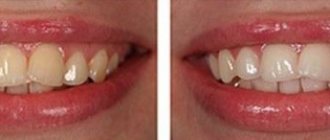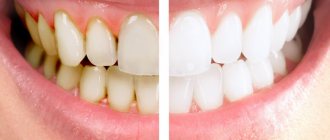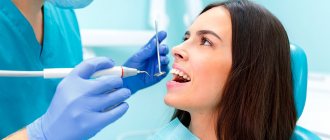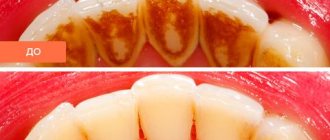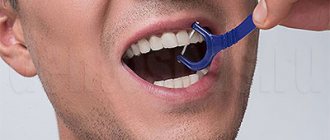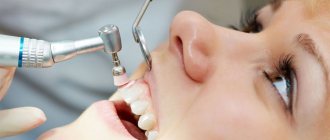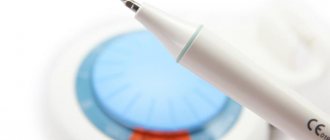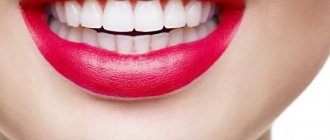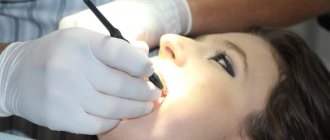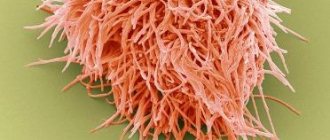Towards the end of the diaper and romper period, it can be scary to look into your mouth. Concern is brought not only by the lack of shine of teeth, but also by their outstanding fragility. The constant presence of dental chips in the mouth causes irritation. There is no need to talk about the absorption of fruits at all, only in grated form - the teeth do not tolerate stress. Let's add to this increased bleeding and salivation.
In order for the child to be born healthy and beautiful, and for the expectant mother to maintain a dazzlingly attractive smile, it is necessary to listen to the advice of specialists.
Forgotten caries
Everyone advises planning a pregnancy, but in some situations it is quite difficult. Pregnancy does not always occur when you want it. In some situations, you have to wait for years for the appearance of a lucky star. Preparations can take so long that it’s easy to forget about pregnancy. And there is no need to talk about a random “vagrant bird”. In general, the first thing a pregnant woman needs to do after returning from the gynecologist is to make an appointment with the dentist. The feeling of complete health is often apparent. A careful examination of the dentition will definitely reveal a couple of holes.
Caries is based on three main problems: damage to the enamel, eating a lot of sweets and microflora in the mouth.
During pregnancy, all three causes are hypertrophied. Frequent vomiting in the first trimester can lead to “acidification” of saliva. Increased appetite contributes to the consumption of more easily digestible carbohydrates (sugar, chocolate, etc.).
In an acidic environment and in the presence of carbohydrates, microflora develops quickly. A vicious circle is formed. Microorganisms, breaking down sugar, contribute to even greater acidification of saliva and destroy enamel. Considering the causes of caries, it becomes clear how important prevention is.
Treatment of caries during pregnancy is not contraindicated, rather the opposite. All kinds of holes in the teeth, even small ones, should be healed. Remember that a small hole can be the entrance to a larger cave.
There are no restrictions regarding the filling material. Moreover, it is better to use a fluoride filling material (which uses a special lamp to cure).
Superficial caries, as a rule, does not require mandatory anesthesia. But if ordinary caries is complicated by the development of pulpitis, then you cannot do without an anesthetic. The doctor will select the safest drug.
Treatment of caries during pregnancy at Dentistry on Shchelkovskaya
Finally, we will tell you what the main feature of visiting a dentist during pregnancy in our clinic is. The fact is that a pregnant woman is often subject to changes in her emotional state, so our dentists show sensitivity and attention to the patient’s condition, protecting her from any kind of physical pain and emotional stress. The dentists of the clinic on Shchelkovskaya perfectly understand the specific health and emotional background of a pregnant woman, so they do everything in their power to make your visit to the doctor calm and pleasant.
The most important thing that you should not do during pregnancy is to ignore toothache and allow the development of oral diseases. Remember that your baby’s health depends on your vigilance. Therefore, even if you feel slightly unwell, or have periodic aching pains, do not tolerate it, make an appointment with a dentist now! Treatment of caries during pregnancy at any stage of development is possible in our clinic. We work seven days a week, located in the Eastern Administrative District in the Izmailovo district at Shchelkovskoye Highway, building 44, building 5. Near us are Golyanovo, Pervomaiskaya, Partizanskaya, Cherkizovskaya.
I feel what I feel in my teeth
During pregnancy, it is especially important to eat right.
However, if hot and cold dishes cause severe aching pain, appetite disappears, in this case at least two suffer (mother and fetus).
The problem of increased tooth sensitivity is associated with the thinning of the enamel, which, like a shell, covers the underlying dentin, enveloping the vessels and the actual sources of pain - the nerves. The appearance of pain is an impetus that forces you to go to the dentist. There may be several reasons for thinning enamel. One of them, the most common, is the loss of calcium by the enamel, as a result of insufficient intake from food and increased consumption by the body. Another reason is early toxicosis, which was already mentioned above. Another reason that is not related to pregnancy, but does occur, is the wrong choice of toothpaste.
Toothpastes of the “Sensitive” type have been developed especially for those with teeth with increased sensitivity.
According to dentists, the most common cause of tooth sensitivity is improper brushing.
To learn how to properly brush your teeth, you must contact a dental center. Training is carried out individually in one session. The cost of this procedure is about 300 rubles. As a rule, the dentist invites the pregnant woman for a follow-up cleaning. To assess whether the patient is coping with the task correctly or not.
Tooth sensitivity can be caused by cervical caries, when a hole in the tooth is located at its base, next to the gum. Then the solution to the problem is only a filling in the problem area. If tooth sensitivity does not decrease, despite all efforts, then “Sensigel” will help, it contains special substances that reduce tooth sensitivity. The cost of the drug is 180-190 rubles. The dental office has pharmacological agents to reduce tooth sensitivity that have a prolonged effect (up to 6 months), but the cost of the procedure is much more expensive.
How does an X-ray machine work?
At the heart of the X-ray machine is an X-ray tube, in which electrons accelerated to high speeds are removed from metal atoms, resulting in X-ray radiation. X-rays pass in a narrow beam through the area of the body being examined, in this case the tooth and part of the tissue around it. The patient holds a photographic plate behind the tooth, on which the image appears. In this case, the width of the beam approximately corresponds to the size of the plate. That is, only a small space around the tooth is trained, and all other organs and tissues remain untouched by radiation.
A narrow beam affects only the teeth and the tissue around them
Important! The radiation intensity is so low that even several photographs of one tooth in a row are not dangerous to health.
Bleeding Gums
If you suddenly notice that while brushing your teeth, traces of blood remain on the brush, and when you further rinse your mouth, the foam from the toothpaste turns pink, this means that you have increased bleeding gums. Increased bleeding is a warning sign that all is not well.
Healthy teeth do not necessarily mean healthy gums. Increased bleeding of gums during pregnancy is not uncommon. It may be due to hormonal changes in a woman’s body. To solve this problem, you need to consult a doctor. In this case, the diagnosis sounds like this: “gingivitis of pregnant women.”
To prevent the occurrence of this unpleasant disease, plaque should be removed and tartar in the subgingival area should be removed. In a dental office, these procedures are performed using different techniques. One of them, the so-called “air flow,” is carried out without the use of a bur and without a tip. A stream of air, water and powder flows under pressure. In this way, plaque and partially tartar are removed. This procedure is also called gentle whitening, since the teeth are restored to their natural shine and whiteness, and the enamel structure does not deteriorate.
Another method of preventing gingivitis allows you to completely remove massive deposits of tartar. It requires the use of ultrasound. The procedure is completed by polishing the teeth and coating them with a special fluoride varnish. Both “air flow” and other methods will require significant material costs. The cost is approximately the same - 80-90 rubles per tooth.
As a rule, gum inflammation is caused by “harmful” microflora of the oral cavity.
A number of toothpastes, including extracts of medicinal plants, have an antiseptic effect. Additions of chamomile, calendula, and sage relieve inflammation and strengthen the gums. To enhance the effect of the paste, it is supplied with a complex of vitamins.
If, however, gingivitis does develop, then after removing plaque and tartar, the dentist will most likely suggest using a special gel for the gums; you can read about it in more detail in the “review of oral hygiene products for pregnant women.”
The gel is used in addition to toothpaste, and not instead. If the manifestations of gingivitis are severe, then gingival anti-inflammatory dressings are used. The course is 3-10 sessions. They contribute to the rapid subsidence of the inflammatory process and reduce bleeding.
It is worth checking your toothbrush; sometimes the reasons for increased bleeding of the gums are quite commonplace - the bristles are too hard.
Increased bleeding may be a symptom of a more serious disease - periodontitis. Periodontium is the soft tissue surrounding the tooth. Their inflammation is periodontitis. It is quite severe and can result in the loss of healthy teeth.
When you can't do without dental x-rays
Blind dental treatment is not recommended for anyone, especially expectant mothers. Thanks to an x-ray, the doctor sees the cause of toothache, the location and form of the inflammatory process, and other important nuances.
Diagnostics is prescribed for:
- filling root canals for pulpitis - it is necessary to determine the shape and length of the canal;
- problematic growth of eights;
- formation of cysts, granulomas and other neoplasms;
- suspected periodontitis (inflammation of the periodontal tissues);
- fracture or tooth root injury.
I don't want to eat, but my mouth is watering
During pregnancy, drooling is common. This type of toxicosis does not pose a threat when it is moderate. Sometimes drooling is a consequence of uncontrollable vomiting. When it takes on a grandiose scale, solivation can reach 1 liter per day.
In this case, the appetite is impaired, the patient loses weight, her health worsens, and the patient must be admitted to a hospital. Treatment is necessary to avoid significant fluid loss. Moreover, with severe salivation, maceration of the skin around the mouth occurs, which can become an entry point for infection.
Some toothpastes have astringent properties: “Localut”, “Oral B”, etc. To prevent irritation, apply a rich cream to the facial skin. X-RAY
Is dental examination contraindicated during pregnancy?
It’s not for nothing that everyone advises to heal your teeth before pregnancy. After all, once it occurs, dental treatment can be difficult. It should be noted that we are talking about problem teeth, for which a simple filling is not an option. Sometimes, in order to provide qualified assistance, it is necessary to first take a picture of the tooth, and then, depending on the situation, treat or remove it. In the first and last trimesters of pregnancy, X-ray examination is not recommended. However, in the second trimester of pregnancy, the ban on dental x-rays is lifted.
If suddenly a problematic tooth makes itself known at the wrong time, and the doctor insists on taking an image, you should not worry too much about it. Because before taking a picture, the laboratory technician will put on a lead apron, which will protect you from that insignificant dose of X-rays that are necessary in this situation.
To avoid trouble, it is better to inform your dentist about your pregnancy. There is a more gentle research method - computer visiography. In this case, the image of the tooth is displayed on a computer screen, the X-ray beam is more focused, and the dose is approximately 10 times less than when taking a conventional X-ray.
Features of female physiology that affect dental implantation
The physiological characteristics of the female body force us to plan dental implantation more carefully, because if they are not taken into account, there is a high probability of rejection of the installed implant.
Let us indicate the periods of life when dental implantation is possible in women (and then we will clarify the key features of each of them):
- over the age of 18, since before this the jaw system is at the stage of formation,
- 3-5 days before and after menstruation,
- no less than 3 months after completion of lactation,
- at least six months before pregnancy,
- during menopause, subject to certain rules and the choice of safer implantation protocols.
The issue of taking into account physiological characteristics is very important - implantation costs a lot of money, requires careful preparation, and the result is the acquisition of a beautiful smile for many years. Therefore, the doctor must take into account age, the onset of “critical days,” possible pregnancy planning, the date of the last birth, and the onset of menopause.
In addition to standard diagnostics, women also need to undergo tests for the level of essential hormones before dental implantation. And if necessary, additionally visit an endocrinologist.
Menstrual cycle
During menstruation, a woman’s body experiences a sharp decrease in the number of platelets - sometimes they become even half as small. Red blood cells influence blood clotting and the formation of fibrin (a protein that promotes wound healing). As soon as capillaries are injured, platelets are immediately sent to this area to help stop bleeding. Consequently, a decrease in the number of platelets threatens the following consequences:
- prolonged bleeding of injured soft mucous membranes,
- internal bleeding at the border of the bone and implant, which leads to the formation of an internal hematoma,
- the formation of fibrous tissue between the bone and the implant due to long-term damage to the capillaries, and this risks the fact that hard bone tissue simply will not “grow” inside the porous surface of the implant. Thus, the implant will not achieve the desired degree of fixation,
- An implant that has not fully taken root will not withstand the load from the installation of a gum former, abutment or prosthesis.
Pregnancy planning and IVF
To achieve high results from dental implantation, large resources of the body are required. Unfortunately, during pregnancy, a woman’s immunity sharply decreases, hormonal levels change completely, the load on the body increases significantly, and the density of bone tissue decreases. Most of the beneficial minerals “leave” to the baby, which he receives through the mother’s body, which is why so often women during pregnancy complain of pain in the bones, loss of fillings and even complete destruction of teeth.
You cannot plan pregnancy or artificial insemination (IVF) earlier than a few months after dental implant surgery. It all depends on the individual characteristics of the body, but on average it should take about 3-4 months. It is at this time that maximum strength from the body is required in order for the implant to fully take root in the bone tissue.
During pregnancy
Despite the theoretical possibility of installing implants during pregnancy, many experts are against it. The implantation operation itself is safer than tooth extraction, except for the use of anesthesia and the need for x-ray diagnostics, which are completely permitted in the second trimester of pregnancy.
Unfortunately, the process of acquiring a new tooth does not end there – the postoperative period follows. It is at this moment that the doctor prescribes a large number of medications, including antibiotics, because without their use the likelihood of complications is very high - and they are contraindicated for pregnant women. In addition, hormonal changes change the mineral composition of bone tissue, which negatively affects the quality of implant healing.
Implantation is not a vital necessity, so it is necessary to wait until the end of pregnancy and breastfeeding.
After the baby is born
After giving birth, most women begin to feed their baby with breast milk, again losing a significant amount of vitamins and minerals. Therefore, implantation can begin only 3 months after the end of the lactation period. This period is allotted to restore women’s health, immunity and to replenish the mineral density of bone tissue.
Menopause
With age, a woman’s body begins to be accompanied by such unpleasant problems as osteoporosis, decreased bone density, thyroid disease, loss of a large number of teeth, up to the occurrence of complete adentia. The changes that occur during menopause will again be taken into account by a professional implantologist.
Healthy teeth for the father and mother are the key to healthy teeth for the child
Already in the fifth or sixth week of pregnancy, the rudiments of the baby’s teeth are formed. If the mother has a “bad” mouth by this period of pregnancy, then the process of mineralization of the fetal tooth buds is disrupted, which over time will lead to problems for the child, both with milk and permanent teeth.
For normal growth of bones and tissues of the unborn child, in addition to other minerals, sufficient amounts of calcium and fluoride are necessary. A well-balanced diet rich in vitamins A, C, D, minerals, plus nutritional supplements or prenatal vitamins will fully compensate the body and promote good overall health and normal dental development for the baby. Nutritional supplements and vitamin-calcium complexes are individually selected by a gynecologist.
Foods richest in calcium: milk and dairy products, kale, broccoli, spinach, baby turnips. Calcium is best absorbed from fish products.
A lack of calcium may be indicated by seizures and tooth decay in the mother. If symptoms appear, you should consult a doctor. You should not take calcium supplements on your own, as an excess of it will lead to skeletal disorders in the fetus.
However, the quality of the baby’s teeth depends not only on the condition of the mother’s teeth. Half of all dental problems in babies are caused by their father. No matter how much a pregnant woman takes care of her mouth, when communicating with her husband, kissing him, she transfers “harmful” microflora into her oral cavity. The husband should have all his teeth treated after, or better yet before, he finds out about his wife’s pregnancy.
There probably won’t be a parent who hasn’t hugged and kissed their barely born child. Every kiss is a swarm of microorganisms, and not always harmless ones.
Be it a father, grandfather or grandmother, everyone considers it their duty to cuddle and breathe on the baby. Before allowing all relatives near the baby, a prudent mother should first send her household members to the dentist's line.
What radiation doses are dangerous?
Radiation doses greater than 1 rad are dangerous for humans. This is the dose at which mutations occur in the fetus in about 4% of cases. If an X-ray of the entire oral cavity is taken, the woman will not receive a radiation dose of more than 0.0002 rad. If we take into account that the beam is narrow and is not directed at the woman’s uterus, then the fetus will not receive a radiation dose at all. Therefore, we can say with confidence that dental x-rays are safe.
X-rays of the jaw require a higher dose of radiation, but even this dose is too small to harm the mother or fetus
Germs and prevention
Expectant mothers simply have to watch their mouth. Severe microbial infection of the teeth and gums of the expectant mother can serve a very sad purpose. Poor hygiene facilitates the unhindered penetration of bacteria from the mother’s mouth into the body of her baby. To prevent unpleasant consequences it is necessary:
- Brush your teeth after each meal for 2-3 minutes, since the action of the antibacterial and mineral components of toothpastes occurs when the paste is in the mouth for at least this time.
- Use additional oral hygiene products (gels, rinses, breath fresheners).
- Change your toothbrush every 3 months.
- Carry out professional teeth cleaning at least once every 4 months, and after childbirth - once every 6 months.
The most favorable times for dental treatment during pregnancy:
1st visit - at 6-9 weeks of pregnancy, 2nd visit - at 16-18 weeks, 3rd - at 26-28 weeks, 4th and last visit - before birth at 36 -38th week of pregnancy.
Before pregnancy and after childbirth, optimal special periods are not established.
Effect of the procedure
It may seem to some that plaque is not dangerous, but its accumulation provokes the development of pathogens that destroy the enamel. A person also develops a characteristic bad breath. Therefore, the benefits of hygienic teeth cleaning should not be underestimated. During pregnancy, this service reduces the risk of caries and prevents the occurrence of oral pathologies. In addition, after ultrasound, the enamel becomes lighter and the dark pigment disappears.
“Tooth rash” after childbirth?
I hope that the child was not born in pain? In order for the child to grow and develop quickly, nature provided the woman with a source of nutrition for the baby - milk. Constant production of a nutritious product is possible only with a regular supply of necessary vitamins from outside. If the teeth have withstood the stress of pregnancy, this does not mean that the feeding process will go unnoticed. It happens that during feeding, teeth simply “melt” before our eyes. What's happening?
Apparently, there is a lack of calcium (or fluorine) in the body. In order to prevent possible destruction, it is necessary to ensure a sufficient supply of minerals, taking into account the consumption for the formation of milk. The mammary glands produce about a liter of milk per day (or even more).
Other Dangers Associated with Dental Treatment
So, the radiation intensity during dental x-rays is too low, but dental treatment is not absolutely safe for the fetus, because there are other factors, such as:
- The influence of anesthesia and other drugs. X-rays are usually done for pulpitis, and this disease requires local anesthesia, since otherwise the pain will be unbearable. In addition, after filling a tooth, anti-inflammatory drugs and antibiotics are prescribed.
- Fear of toothache. The fear experienced when visiting the dentist can harm the fetus no less than medications.
Removing dental pulp
Important! Some medications used to kill the nerve contain toxic substances. In terms of harm caused, they exceed the radiation exposure from a dental x-ray by thousands of times.
Dental prosthetics and pregnancy
This problem is especially relevant during late pregnancy. After 30 years, it is difficult to find a woman who has not lost at least one tooth. And if there are no teeth or they require removal, then the question of prosthetics arises. Anyone who has already received their “bridge” or “implant” knows how much time, effort and money goes into this process (in any case, a good half of the pregnancy can pass).
Is it possible to have dental prosthetics during pregnancy? Yes, you can. When using modern materials, prosthetics can be completed in 2 weeks. This process will require 2-3 visits. If pregnancy occurs after the start of the prosthetic process, then it is necessary to complete it, since against the background of hormonal changes in the body, the teeth may become loose, change the position and inclination, which will further complicate prosthetics.
Implantation is out of the question, since this is a surgical operation, it is difficult to perform and complications may occur.
Effect of anesthesia
Sitting at the dentist's office, people are afraid of the discomfort and pain that always accompany dental treatment. But a solution has long been found - pain relief. How do pregnant women tolerate anesthesia? Are they allowed to take painkillers? Many dentists answer that such an injection is simply necessary. After all, expectant mothers will experience unnecessary anxiety and fear of feeling pain while waiting for their turn to see a doctor. And stress negatively affects the well-being and development of the baby in the womb, so she does not need worry at all and is even contraindicated.
Is it safe to give a painkiller injection to pregnant women? If we are talking about general anesthesia, then its influence can still negatively affect both the child and the expectant mother. But local anesthesia can be done using modern medications. They will perfectly anesthetize a small area of the gum, since they act in a targeted manner, and will limit the pregnant woman from terrible torment in the dental chair during the treatment process. In addition, the dose of the drug is very small, so you should not be afraid that the drug gets to the baby along with the blood; its components will still not pass through the placenta.
Rotten tooth! Delete or wait?
Elena K.: “Before pregnancy, I had very bad teeth, some required removal, and I didn’t have enough time and courage to go to the dentist. Now that I'm pregnant, I'm afraid of being completely without teeth. What is the best thing to do?
Due to the environment, not everyone can boast of healthy and white teeth, especially those with average and low incomes. So if pregnancy threatens to deprive you of your last teeth, you need to take immediate action. Remove all rotten, damaged teeth that cannot be restored. Firstly, this will eliminate the source of infection from the mouth, and secondly, diseased teeth tend to worsen during childbirth. And then you may have to give birth in the dentist’s office with an acute toothache.
Thanks to the development of new anesthetics that do not pass through the blood-placental barrier, removal will not be a particular problem. New drugs “Ubistezin” and “Ultracain DS” will provide fast and reliable anesthesia.
The safest time for tooth extraction is the 3-6th month of pregnancy.
Which is more harmful: radiation or disease?
If we compare the harm from pulpitis with the harm from an x-ray of a tooth, then we can say with confidence that pulpitis is much more harmful for both the mother and the unborn child. The main aspects of this disease that can harm the fetus are as follows:
- Pulpitis weakens the mother's immune system. The constant inflammatory process inside the tooth forces the immune system to wage a constant battle, making the body vulnerable to colds and other diseases.
- Toothache deprives a mother of sleep. Since exacerbations of pulpitis most often occur at night, the patient is deprived of rest, which exhausts the nervous system in the same way as severe stress.
- Untreated pulpitis can lead to an increase in body temperature.
- Constant pain itself causes a lot of stress.
- Toothache interferes with normal nutrition.
Pulpitis of the tooth
Thus, an acute toothache can become a more serious test for the mother and her unborn child than instantaneous irradiation of the tooth.
Addition! Severe nervous shock associated with pain or fear can even lead to miscarriage.
Regular toothbrush or electric?
During the first half of pregnancy, a medium-hard toothbrush is suitable. By the third trimester, it is better to choose a soft brush, as this will avoid bleeding gums. Of course, unless there is a tendency to form hard plaque.
If you are used to using an electric toothbrush, then it is better to put it aside during pregnancy and use it only occasionally. Undoubtedly, the electric miracle removes plaque better. However, it has a greater traumatic effect on the gums than a regular toothbrush, and the gums are perhaps one of the most vulnerable places in a pregnant woman’s mouth.
If you really want to thoroughly clean your teeth, leave this procedure to a professional. Cleaning your teeth at the dentist's office will cost about 1,000 rubles.
Advantages of contacting PROFI-Dent
- Absolute safety of dental intervention at any stage of pregnancy.
- A team of experienced dentists of all specialties.
- An integrated approach to diagnosis and treatment.
- Unique proprietary therapeutic techniques.
- Affordable prices for the full range of dental services.
